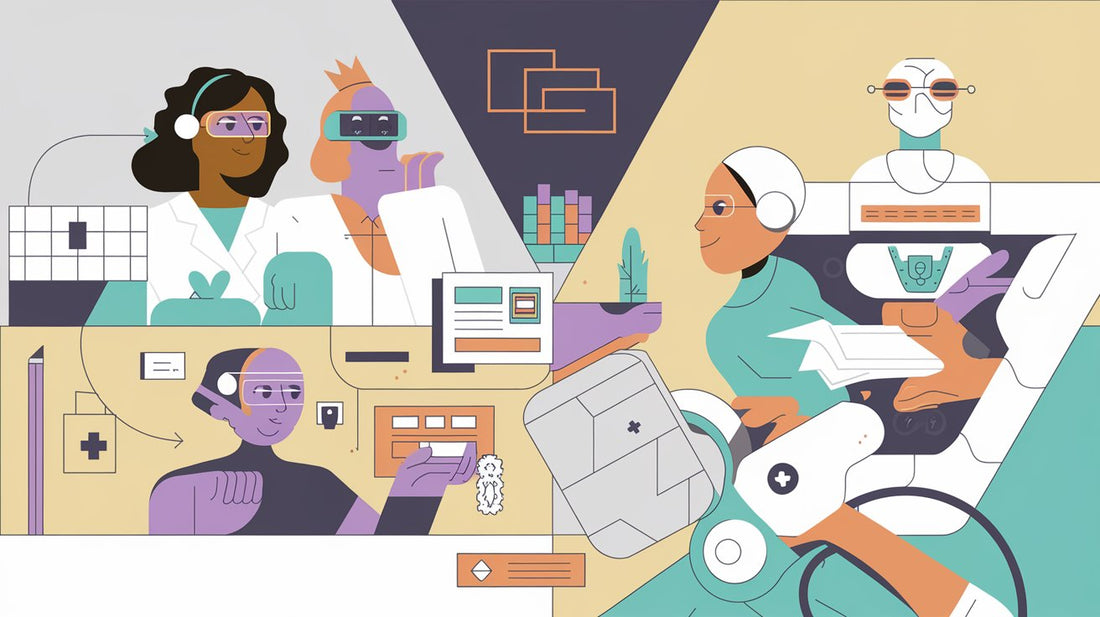
AI Ethics and Its Impact on Healthcare Jobs
Share
The rapid integration of artificial intelligence (AI) into healthcare is reshaping the industry, bringing both opportunities and challenges for healthcare professionals. From enhancing diagnostic accuracy to optimizing administrative workflows, AI is revolutionizing how care is delivered. However, alongside its benefits, AI also raises important ethical concerns that healthcare leaders must address to ensure responsible and equitable implementation.
The Impact of AI on Healthcare
AI has significantly impacted healthcare in several areas, such as improving diagnostic precision, predicting patient outcomes, and reducing human error. For instance, AI-powered algorithms can analyze vast amounts of patient data to detect diseases earlier than traditional methods, often with higher accuracy. In administrative roles, AI can streamline operations, such as scheduling and billing, freeing up healthcare professionals to focus on patient care. This increased efficiency has the potential to reduce costs and improve access to care, especially in underserved areas.
However, while AI reduces human error, it is not infallible. The reliance on AI introduces new risks, such as biased algorithms and data privacy concerns. In some cases, errors in AI-driven diagnostics or treatment recommendations could lead to adverse patient outcomes, highlighting the need for human oversight and ethical safeguards.
Ethical Principles for AI in Healthcare
The integration of AI into healthcare must be guided by ethical principles to ensure that it benefits patients and healthcare professionals alike. The five core ethics of AI—beneficence, non-maleficence, autonomy, justice, and transparency
- Beneficence: AI systems should aim to enhance patient care and improve health outcomes.
- Non-maleficence: AI must be designed to minimize harm, ensuring that algorithms are rigorously tested for accuracy and safety.
- Autonomy: Patients should have control over their data and be informed about how AI influences their care decisions.
- Justice: AI should promote equitable access to healthcare and avoid perpetuating biases that could disadvantage certain populations.
- Transparency: Healthcare professionals and patients should understand how AI systems work and how decisions are made.
These principles form the pillars of AI ethics, guiding the development and implementation of AI technologies in healthcare. However, ethical concerns often arise when these principles are compromised. For example, biased algorithms may disproportionately affect minority groups, leading to disparities in care. Additionally, the use of generative AI in patient communication or diagnosis can raise questions about accountability and the role of human judgment.
Balancing the Pros and Cons of AI
The advantages of AI in healthcare are clear—it can improve efficiency, reduce errors, and enhance patient outcomes. However, these benefits must be weighed against potential drawbacks. One major ethical concern is the displacement of healthcare jobs, as AI automates tasks traditionally performed by humans. While AI can enhance roles by allowing professionals to focus on more complex tasks, it may also lead to job insecurity for some healthcare workers.
Another concern is the erosion of the patient-provider relationship. While AI can assist in diagnosis and treatment, it lacks the empathy and human connection that patients often seek in their care. Ensuring that AI complements rather than replaces human interaction is essential to maintaining trust and patient satisfaction.
Addressing AI Ethical Dilemmas
Solving ethical issues related to AI in healthcare requires a collaborative approach involving technologists, healthcare professionals, policymakers, and ethicists. Strategies to address these dilemmas include:
- Developing robust regulatory frameworks to ensure that AI systems are safe, transparent, and accountable.
- Implementing continuous monitoring and evaluation of AI algorithms to identify and mitigate biases.
- Providing training and education for healthcare professionals to understand and effectively use AI tools while maintaining ethical standards.
Healthcare organizations must also foster a culture of ethical decision-making, where technology is used responsibly to enhance, rather than undermine, patient care.
The Future of AI Ethics in Healthcare
As AI continues to evolve, ethical concerns will remain at the forefront of discussions about its role in healthcare. In 2024 and beyond, issues such as data privacy, algorithmic bias, and the ethical use of generative AI will shape the future of healthcare technology. Addressing these concerns is critical to ensuring that AI benefits all stakeholders, from patients to healthcare professionals.
For healthcare professionals navigating the complexities of AI integration, understanding the ethical implications is essential to maintaining trust and delivering high-quality care. At Energized Vision, we offer tailored coaching and support to help healthcare leaders and professionals adapt to the evolving landscape of healthcare technology. If you’re looking to enhance your skills and navigate the ethical challenges of AI in healthcare, Schedule your free discovery call with us today.

